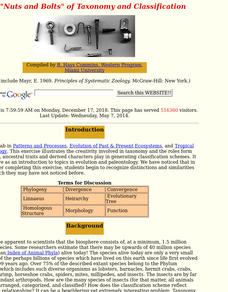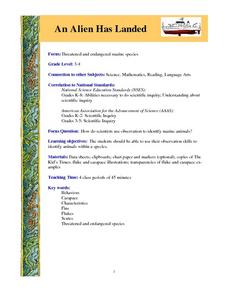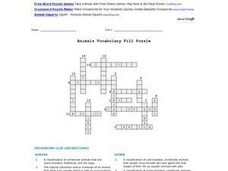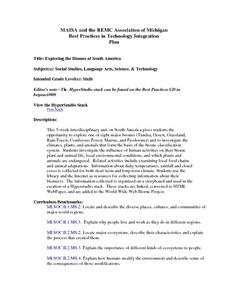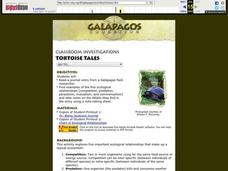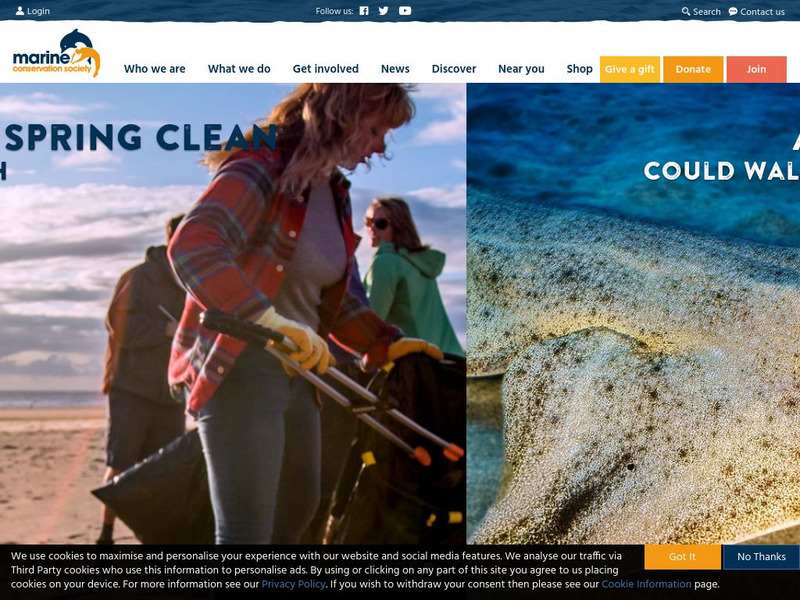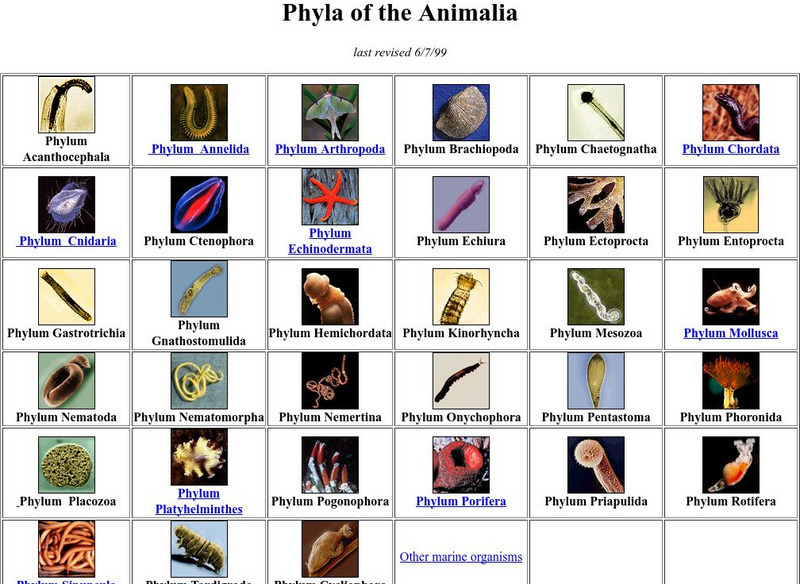Curated OER
The "Nuts and Bolts" of Taxonomy and Classification
Students develop classification scheme that meets the established rules of the Linnaean system. They write one page essay on classification choices.
Curated OER
Under The Sea
In this resource activity, students use non-fiction books to research ocean animals. Students discover the many features of non-fiction books and how to use these features to help them conduct research. Students then categorize...
Curated OER
Animals Vocabulary Maze
In this animal vocabulary worksheet, students read the clue and answer it with an animal vocabulary word and then find the word in the maze. Students complete 14 questions.
Curated OER
Blue Planet: Open Ocean
Students research facts about animal species. In this ocean lesson plan students view a video, prepare illustrated cards and create a food-web display.
Curated OER
An Alien Has Landed
Students identify animals within a species by using their observation skills to record information, such as behavioral characteristics.
Curated OER
Animals Vocabulary Fill Puzzle
In this science worksheet, students figure out the answers to 15 clues going across and down associated with vertebrate animals. Students fill in a crossword puzzle.
Curated OER
Explorations Through Time
In this earth history worksheet, students visit a website and complete 15 fill in the blank and 8 short answer questions based on what they read. Topics include biodiversity, animal kingdoms, evolution, fossils, and extinction.
Biology Junction
Mollusks
Mollusks created every shell on Earth. Young scientists learn more about the phyllum mollusca in an informative presentation. It covers their characteristics, body plans, and relationships in the ecosystem. Then, it details each class of...
Curated OER
Animals Quick Vocabulary Review Worksheet
In this animals vocabulary worksheet, students write the animal vocabulary word that goes with the definition. Students complete this for 15 words.
Curated OER
Animals-Spelling Activity
In this animals spelling worksheet, students are given definitions related to animals and their habitat, then fill in missing letters in words to complete the matching animal spelling word.
Curated OER
Galapagos Adaptations
Students examine photographs of closely related species found in the Gal??pagos environment, observe differences and similarities between species, and form hypotheses about species differences and the relationship to the environment of...
Curated OER
Under the Sea
Students identify and interpret that non-fiction books have features like a table of contents, a glossary, and an index, which can efficiently help them find information. They also identify how to narrow the search for information by...
Curated OER
Exploring the Biomes of South America
Sixth graders complete a five-week unit investigating the eight major biomes of South America. They conduct Internet research, collect short-term and long-term climate data, and create a HyperStudio slideshow stack about a selected biome...
Curated OER
Exploring Limu Diversity
Learners explore limu diversity. For this ocean ecosystem lesson, students classify limu according to its physical properties. Learners work in small groups to generate scientific observations and sort limu by characteristics.
Curated OER
Tortoise Tales
Students read journal entry from a Gal??pagos field researcher, find examples of five ecological relationships (competition, predation, parasitism, mutualism, and commensalism) and take notes on the details they find in the entry using a...
Curated OER
Adventuring in the Archipelago
Students study Charles Darwin's voyage on the HMS Beagle and his visit to the Gal??pagos Islands. They click through an interactive map of the Gal??pagos Islands to read actual and fictional journal entries from a fellow eco-tourist.
Curated OER
Sharkland Wiki
Students, while researching the waters around southern Africa and viewing a video of the episode "Sharkland" from Thirteen's series NATURE, critique reliability of online resources and analyze the various components of a wiki. They...
Other
Mcsuk: Seas Fit for Life
In this thorough site, you will find lots of teacher resources including marine environmental issues.
Wonderville Media
Wonderville: Deep Sea Creatures
We all know that the ocean is home to many beautiful and mysterious creatures. Mysterious cannot begin to describe the fish living in the depths of the ocean. Imagine the kind of creature that lives thousands of feet underwater! Sunlight...
Regents of the University of Michigan
Animal Diversity Web: Class Polychaeta
Resource provides a general description of marine worms, including sand worms, tube worms and clam worms.
Quia
Quia: Animal Facts Scavenger Hunt
At this website you are given ten questions to answer and links to three websites where you can find those answers.
Columbia University
Columbia University: Phyla of the Animalia
Visual and textual information of the major animal phyla with a focus on marine organisms.
Kidport
Kidport: Who Eats What?
At this site students are encouraged to try and answer questions that relate to what animals eat. At the bottom of the web page are beautiful pictures of land and sea animals and when selected, students will be able to read short facts...
E-learning for Kids
E Learning for Kids: Science: Antilles: How Can We Classify Animals?
Naomi teaches diving and meets all kinds of animals underwater. Join her and learn about grouping animals.


